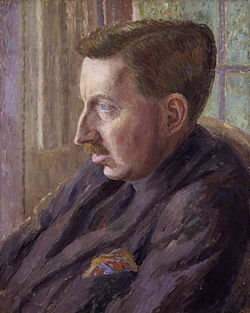E.M. Forster Quote
In daily life we never understand each other, neither complete clairvoyance nor complete confessional exists. We know each other approximately, by external signs, and these serve well enough as a basis for society and even for intimacy. But people in a novel can be understood completely by the reader, if the novelist wishes; their inner as well as their outer life can be exposed. And this is why they often seem more definite than characters in history, or even our own friends; we have been told all about them that can be told; even if they are imperfect or unreal they do not contain any secrets, whereas our friends do and must, mutual secrecy being one of the conditions of life upon this globe.
In daily life we never understand each other, neither complete clairvoyance nor complete confessional exists. We know each other approximately, by external signs, and these serve well enough as a basis for society and even for intimacy. But people in a novel can be understood completely by the reader, if the novelist wishes; their inner as well as their outer life can be exposed. And this is why they often seem more definite than characters in history, or even our own friends; we have been told all about them that can be told; even if they are imperfect or unreal they do not contain any secrets, whereas our friends do and must, mutual secrecy being one of the conditions of life upon this globe.
Related Quotes
The 10 ever greatest misplacements in life:1. Leadership without character.2. Followership without servant-being.3. Brotherhood without integrity.4. Affluence without wisdom.5. Authority without consc...
You can lead if you can serve. You can serve when you can love. You can love when you are graced. The truth is that God knows love will be needed in volumes, this is why he made his grace abundant. Le...
About E.M. Forster
Considered one of the most successful of the Edwardian era English novelists, he was nominated for the Nobel Prize in Literature in 22 separate years. He declined a knighthood in 1949, though he received the Order of Merit upon his 90th birthday. Forster was made a Member of the Order of the Companions of Honour in 1953, and in 1961 he was one of the first five authors named as a Companion of Literature by the Royal Society of Literature.
After attending Tonbridge School, Forster studied history and classics at King's College, Cambridge, where he met fellow future writers such as Lytton Strachey and Leonard Woolf. He then travelled throughout Europe before publishing his first novel, Where Angels Fear to Tread, in 1905. The last of his novels to be published, Maurice, is a tale of homosexual love in early 20th-century England. While completed in 1914, the novel was not published until 1971, the year after his death.
Many of his novels were posthumously adapted for cinema, including Merchant Ivory Productions of A Room with a View (1985), Maurice (1987) and Howards End (1992), critically acclaimed period dramas which featured lavish sets and esteemed British actors, including Helena Bonham Carter, Daniel Day-Lewis, Hugh Grant, Anthony Hopkins and Emma Thompson. Director David Lean filmed another well-received adaptation, A Passage to India, in 1984.
